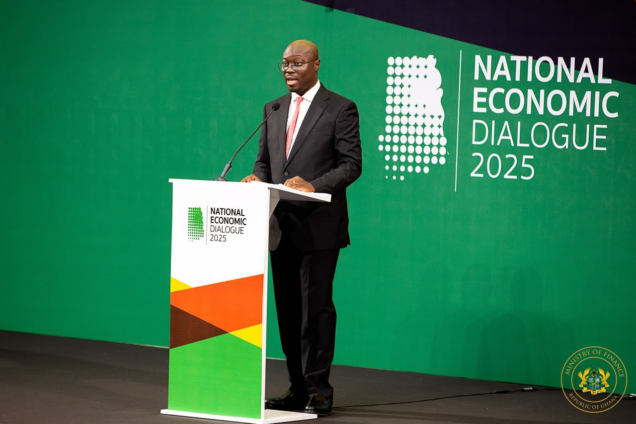Finance Minister, Dr Cassiel Ato Forson, has warned that excessive and inefficient public spending is pushing the country towards economic instability.
Speaking at the National Economic Dialogue in Accra, he stressed the urgent need to reform government expenditures, calling for tighter fiscal discipline and better resource allocation.
Dr. Forson revealed that Ghana’s government expenditure has grown faster than GDP over the past decade, leading to an unsustainable fiscal situation.
The bulk of spending is tied up in wages and salaries, which consume a significant portion of government revenue, high energy subsidies, which drain public funds without improving efficiency and ballooning interest payments, leaving little room for investment in infrastructure and social services.
“These rigid expenditures make it almost impossible to direct resources toward economic transformation. We are spending more but getting less in return,” he lamented.
The Finance Minister criticised the poor allocation of resources in crucial sectors, particularly healthcare, education, and infrastructure.
Health Sector Underfunding and Misuse
Despite growing healthcare demands, the National Health Insurance Scheme (NHIS) is struggling due to financing shortfalls and misallocation of resources.
Dr Forson revealed that only 58% of NHIS funds go towards actual claims payments, with the rest diverted to non-core activities.
“The NHIS is meant to ensure healthcare for all, but inefficiencies and financial leakages are crippling it,” he stated.
Education Spending Failing to Deliver Results
Education spending is skewed toward secondary and tertiary levels, leaving basic education underfunded.
A significant portion of funds is allocated to staff compensation, with little left for classroom materials or infrastructure improvements.
“Our children are our future, yet the majority of education funds go to wages rather than improving learning conditions,” Dr Forson pointed out.
Infrastructure Projects Left Unfinished
The Minister also highlighted the wasteful spending on incomplete infrastructure projects, citing Agenda 111, where $400 million was spent over four years without a single operational hospital. Completing these projects would require an additional $1.5 billion.
“We cannot continue spreading resources across too many projects without completing any. This approach is wasteful and unsustainable,” he said.
Dr. Forson described Ghana’s energy sector as a major financial burden, costing the country 2% of GDP annually.
He noted that despite government transfers totaling $2.1 billion over the past two years, the energy sector remains in crisis, with projected financial shortfalls exceeding $9 billion by 2026.
Key issues include high generation costs due to lack of competition, massive revenue losses by ECG, which collects only 62% of total energy sold and tariffs that do not reflect real costs, leading to mounting debts.
“The energy sector is bleeding our economy. Without radical reforms, it will become unsustainable,” Dr. Forson warned.
To address these spending inefficiencies, Dr. Forson outlined several urgent reforms, including reallocating funds to priority areas, such as healthcare, education, and infrastructure, enhancing efficiency in public spending, and ensuring every cedi is spent effectively.
He also mentioned reforming state-owned enterprises (SOEs), including COCOBOD and ECG, to reduce financial losses and eliminating wasteful subsidies, while protecting the vulnerable.
Dr Forson also called for Implementing strict procurement and financial management controls to curb corruption and mismanagement.
“We cannot afford to continue spending recklessly. Every Ghanaian is feeling the impact of poor financial decisions. Now is the time for discipline, accountability, and smarter spending,” he concluded.
The National Economic Dialogue continues with discussions on how to implement these critical reforms.
Latest Stories
-
We waste human resource and over-politicise the system – Prof Adu-Gyamfi
10 minutes -
CHRAJ joins global effort to commemorate 2025 World Day against child labour
15 minutes -
Military reshuffle will boost morale – Defence Minister
16 minutes -
Ghana lost its direction after independence – Prof Yaw Adu-Gyamfi
19 minutes -
Technology brand, TECNO becomes global partner of the TotalEnergies CAF AFCON 2025 & 2027
21 minutes -
MTN Ghana begins 21 Days of Y’ello Care with focus on digitalisation in rural communities
50 minutes -
Professor Adu-Gyamfi backs constitutional reforms, calls for return of power to the people
59 minutes -
Ghana’s health system is ill-structured and lacks discipline – Prof Adu-Gyamfi
1 hour -
We let ourselves down – Antwi reflects on Kotoko’s title miss
1 hour -
Health Minister owes nurses an apology; his actions are killing patients – Former GRNMA President
1 hour -
‘Great start at Kotoko but injuries held me back’ – Emmanuel Antwi
1 hour -
Reject ‘Apor’ and other malpractices – Accra Mayor cautions BECE candidates
1 hour -
2025 BECE: 10 arrested for malpractices
1 hour -
FIFA Ranking: Black Queens drop to 66th globally and now 6th in Africa
2 hours -
ofi Ghana improves access to education with new schools and supplies in 5 cocoa communities
2 hours

